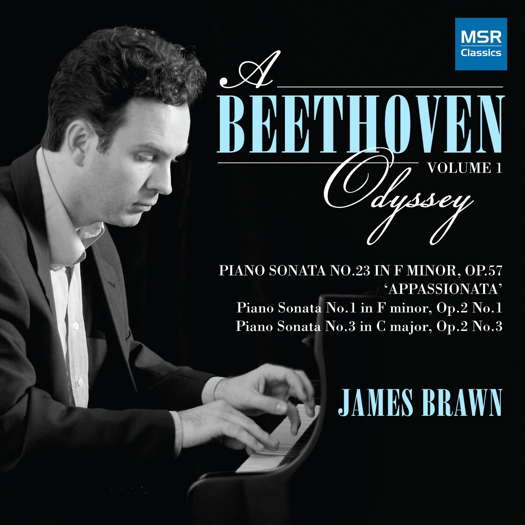 SPONSORED: CD Spotlight. Masterfully Controlled - James Brawn's Beethoven Odyssey impresses Andrew Schartmann.
SPONSORED: CD Spotlight. Masterfully Controlled - James Brawn's Beethoven Odyssey impresses Andrew Schartmann.
All sponsored features >>
THE SELF-ASSURED CONDUCTOR

ANETT FODOR tells the story of Arthur Nikisch, from his Hungarian roots to international acclaim
Early years
Arthur Nikisch, the world-famous conductor, was born on 12 October 1855 in Lébényszentmiklós (now Mosonszentmiklós), Hungary. His mother, Ludovika Roboz, belonged to a noble Hungarian family, whilst his father, Augustin, hailed from Moravia and worked as an accountant on the estate of Baron János Sina in Hungary.
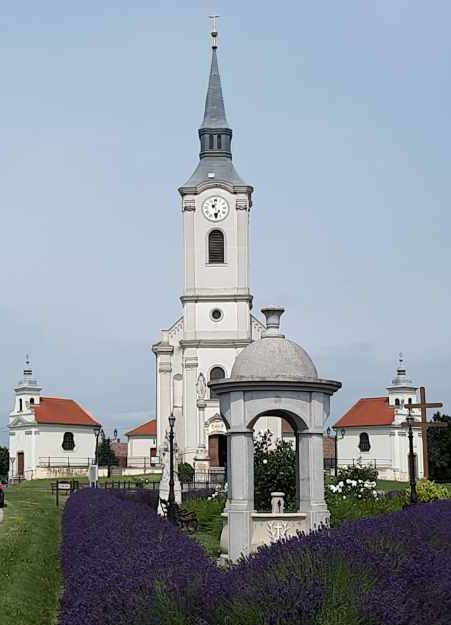
Arthur Nikisch was baptised in this
picturesque church of Lébényszentmiklós
in 1855. Photo © 2023 Anett Fodor
Arthur's musical talent was already obvious when he was four years old. At the age of eight, he was performing as a piano virtuoso and attracted a great attention with his dynamic playing.
He spent his early childhood in Lébényszentmiklós before pursuing his musical education at the Vienna Conservatory, where he studied under Joseph Hellmesberger and Felix Otto Dessoff.
Nikisch excelled on both the violin and the piano. In March 1877, Henryk Wieniawski gave a violin recital in Vienna, with Nikisch accompanying him on the piano for Mendelssohn's well-known concerto. Upon completing his studies, Nikisch joined the orchestra of the Vienna Opera House as a violinist, performing under the baton of notable figures such as Liszt, Verdi, Wagner and Brahms. These direct personal experiences influenced his development of a distinctive performing style as a future conductor.
Nikisch's illustrious international career began when he was appointed as a choral coach at the Leipzig Opera, and within a year, he ascended to the position of principal conductor. During his time in Leipzig, Nikisch acquired invaluable knowledge and expertise as an opera conductor.
As his reputation spread, Nikisch received invitations from important cities across Europe, as the New World also beckoned. In 1889, he embarked upon a four-year sojourn in America as a guest conductor with the Boston Symphony Orchestra. Travelling extensively on a luxurious train dedicated to him, Nikisch's extraordinary artistry received acclaim in cities throughout America.
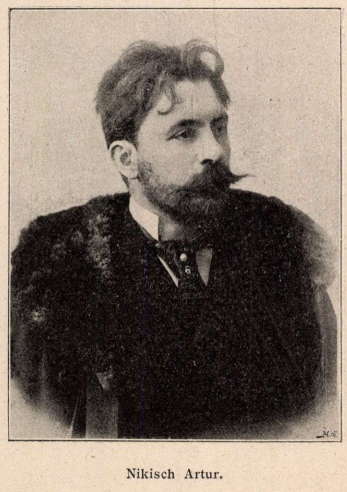
Nikisch Artur. Source: old Hungarian Magazine
Magyar Szalon (April-September 1895)
Boycotting Budapest: A Defiant Stand Against Disrespect
Following Gustav Mahler's resignation, from 1 June 1893 to 5 August 1895, Nikisch held a position at the Opera House in his home country. Budapest extended an invitation to him to become the first conductor and opera director. Surprisingly, he spent only a brief two-year period in Hungary, during which he conducted notable premieres including Humperdinck's Hansel and Gretel, Hubay's The Violin-Maker of Cremona, Puccini's Manon Lescaut, Smetana's The Bartered Bride, J Strauss' The Bat, and led a large orchestra in the Budapest premiere of Berlioz' complete Romeo and Juliet.
The reason for his premature resignation from Budapest stemmed from a blow to his self-esteem. In the summer of 1895, the Hungarian Royal Opera House was abuzz with activity. The management decided that in the Millennium Year (the thousandth anniversary of the Kingdom of Hungary) the Opera House would continue performances throughout the summer, necessitating the preparation of a double season. Additionally, the Royal Intendant, Baron Elek Nopcsa, desired to stage some customary performances on the King's birthday and St Stephen's Day.
During the same summer, Nikisch enjoyed his holiday as stipulated in his employment contract. He stayed with his family in Bad Ischl, a favourite residence of Johannes Brahms, where several distinguished Hungarian artists accompanied him, including János Kössler (the composition teacher of Bartók, Kodály, and Dohnányi, amongst others), Dr Viktor Dalnoky (an opera singer), Ferenc Mihályi (an opera singer and former Director General of the Hungarian Opera House), Zsigmond Bürger (a cellist), and Dr Béla Diósy (a music critic and journalist).
Diósy recalled that notorious day as follows:
In the afternoon of 4 August, earlier than usual, Nikisch made an appearance at the Café, his face displaying distress and his eyes filled with an ominous gleam. Startled, his friends swiftly rose from the card table and gathered around him.
Brahms, filled with concern, urgently inquired, 'What's the matter? What has happened?!'
Nikisch responded, 'Something terrible. Look!'
He retrieved a telegram from his pocket, hesitant to reveal its contents. However, Brahms impulsively snatched the paper from his hand, and it quickly circulated among the group. The message contained a shocking directive:
'His Excellency Intendant Nopcsa orders you to report for duty immediately.'
The impact of the telegram was profound. 'How can one address a world-renowned artist in such a manner?' exclaimed one of the friends.
Another questioned, 'Are you this gentleman's valet?'
Echoing the sentiment, someone added, 'Master, you cannot tolerate this!'
At that moment, Brahms intervened and offered his perspective: 'My friend, there is only one appropriate response to such a situation: the famous injunction of Götz von Berlichingen.' ['Kiss my arse'!]
Nervously biting his moustache, Nikisch attentively listened to the exasperated pieces of advice shared by his companions. After careful consideration, Nikisch firmly declared, 'I refuse to respond in a manner befitting a military barracks. Instead, I have decided not to return to Budapest at all. I can no longer work with Baron Nopcsa.'
The incident had a lasting impact on Nikisch's career: he could not be persuaded to appear in public in Budapest again. Despite his previous success and popularity in the city, he chose to distance himself from it, refusing to appear. His decision, though perhaps a loss for Budapest's music scene, demonstrated his strong character and unwillingness to compromise his artistic integrity. The concert agencies repeatedly offered him huge fees to conduct there - but in vain.
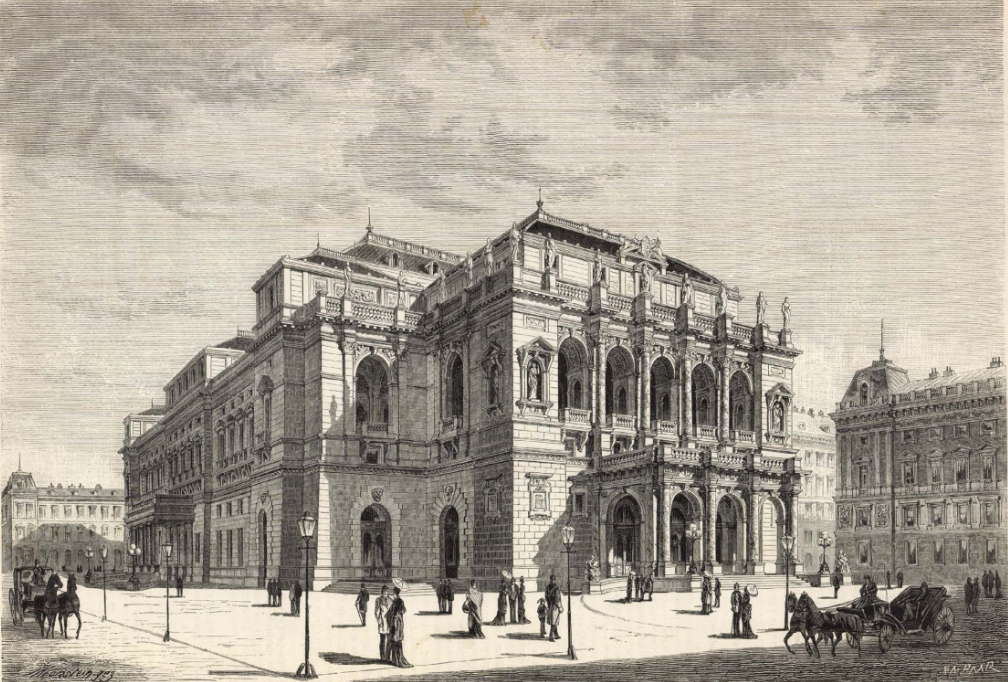
The Hungarian Royal Opera House in Budapest. Source: the old Hungarian Magazine, Vasárnapi Újság, 28 September 1884
An Outstanding Musical Odyssey
No sooner had he left the Hungarian capital than the Gewandhaus invited him to become their permanent conductor. Nikisch settled down in Leipzig, and a new golden age dawned for the prestigious Leipzig orchestra. But Nikisch was not one to stay at home! When the Berlin Philharmonic called him to take the orchestra on a European tour as Bülow's successor, he was delighted to take a break from his Leipzig post and tour Europe. His concerts in Rome, Switzerland and Scandinavia brought him and his orchestra great glory and acclaim. He received invitations from the Hamburg orchestra, the London Symphony Orchestra and the Concertgebouw in Amsterdam, and Nikisch's genius triumphed everywhere. In 1905, he was appointed head of the conducting department at the Leipzig Conservatory. A few years later in 1912, he embarked upon another successful tour in America.
In 1920, he celebrated his twenty-fifth anniversary as the Principal Conductor of the Gewandhaus orchestra. The following year he conducted fifteen concerts in Buenos Aires, then returned to Leipzig and continued working until the very end. Arthur Nikisch passed away on 23 January 1922, at the age of sixty-seven.
Nikisch's Captivating Style
Nikisch's musical artistry was firmly rooted in the Romantic era. A master of interpretation, he frequently conducted the works of renowned composers such as Liszt, Schumann, Wagner, Tchaikovsky, Bruckner and Brahms. However, his musical prowess extended beyond the familiar, as he also delved into the works of Mahler, Reger and Richard Strauss, understanding and interpreting their compositions with finesse.
Renowned for his unique approach, Nikisch's contemporaries noted his improvisatory style, infusing classical pieces with a distinct romantic flavour. Having honed his skills as an orchestral musician for many years, he possessed an extraordinary ability to feel and express the essence of a musical composition. With his background as a violinist, he crafted exquisite timbres from the string section, creating exceptional textures.
In rehearsals, Nikisch favoured slower tempi, allowing the music to breathe and unfold organically. While he conducted the original tempi primarily during grand rehearsals or occasionally only at concerts themselves, his expressive gestures and profound understanding of the music captivated both musicians and audiences alike.
Remarkably, Nikisch achieved extraordinary results without uttering a harsh word. His gentle demeanour inspired his musicians to perform at their best whenever he raised his baton. His brilliance on the podium enabled him to improvise effortlessly.
Listening to some of his surviving recordings, one can imagine Nikisch's exceptional charisma. In 1913, as the conductor of the Berlin Philharmonic Orchestra, he recorded Beethoven's Fifth Symphony, earning credit for the first complete recording of a symphony.
Nikisch's profound musical legacy continues to inspire generations of musicians and listeners alike, solidifying his reputation as a truly extraordinary and influential figure in the world of classical music.
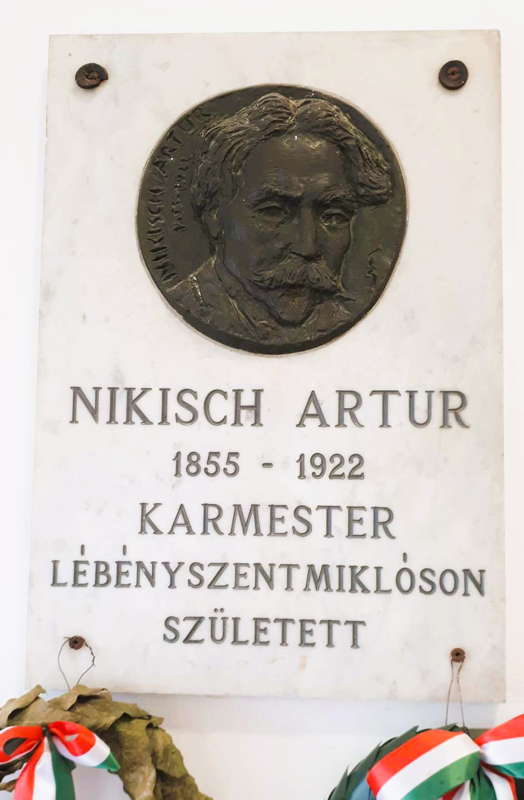
To commemorate their celebrated citizen,
the village of Lébényszentmiklós
named a street after Arthur Nikisch
and erected a plaque in his honour.
Photo © 2023 Anett Fodor
Feature copyright © 29 June 2023
Anett Fodor,
Győr-Moson-Sopron, Hungary




